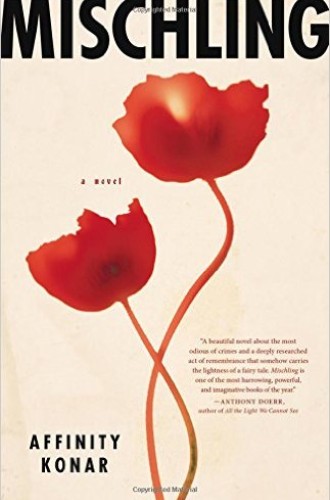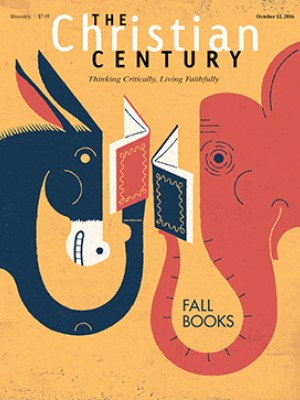Twins with a Nazi doctor
Affinity Konar’s harrowing novel invites us into the world of twin sisters Stasha and Pearl Zamorski, a world whose portal is a crowded journey in a cattle car, their coming days a trudge toward terror. The girls, at 12 years old, are delivered into the “care” of Nazi doctor Josef Mengele and entered into his collection of genetic curiosities. Their delivery is perceived as a privilege, for the relative safety of their families has been promised. Of course, promises are often meant to be broken.
It’s easy to forget that the protagonists of this well-researched story are children, if in name only. Their measured and thoughtful narrative voices belie their youthfulness, raising the question: Could one possibly retain one’s innocence in a place like Auschwitz? Nevertheless, the children rely upon games to pass the time. They fashion creatures in the clouds during stolen glances at the sky. Their comprehension of the cruel “experiments” in which they are involved is questionable.
Read our latest issue or browse back issues.
For instance, Stasha believes that she has been rendered deathless thanks to one of “Uncle” Mengele’s injections, a fanciful notion that disturbs more than it comforts. This childish idea eventually leads Stasha to a nuanced, wise-beyond-her-years observation:
My blood was thick with the thwarted survival of masses; it carried the words they’d never say, the loves they’d never know, the poems they’d never make. It bore the colors of the paintings they’d never paint, the laughs of the children they’d never bear. This blood made living so hard that sometimes I wondered if it was good that Pearl was spared deathlessness. Knowing the fullness of what I had chosen, I would not have wished her this fate—to live alone, a twinless half, forever burdened by the futures torn from others.
She recognizes the inherent obligation of survival and the sacrifice it entails. Even as Stasha believes death is denied her, she becomes encumbered by the lives others have lost. This is not a gift, but rather a life sentence.
Mischling was a vaguely offensive term referring to a person of mixed ancestry. The girls’ grandfather, Zayde, tries to neutralize the concept, teaching them a game he calls The Classification of Living Things. He identifies and celebrates the pronounced variation in all of life. Stasha in turn reclaims the term of her own accord. “I was a hybrid of a different sort, a powerful hybrid forged by my suffering. I was now composed of two parts. One part was loss and despair. Such darkness should make life impossible, I know. But my other part? It was wild hope.”
This novel is just such a hybrid. It is one part abject despair, loss compounded with each passing day. It is another part wild hope, almost reckless in its enthusiasm. It’s the very worst humanity has to offer, set against the very best.
A quiet longing lies beneath the suffering and sadness of Auschwitz. It finds a voice in unexpected venues, like the haunting music that greets each arrival to the camp. The music lulls those who hear it into a false sense of normalcy which quickly becomes repugnant. Yet as Pearl stands with her friend Peter she welcomes the discordant chords “because it was the sound of what we’d lost—the strains of those years that should have happened and now never would. I wanted to approximate a piece of those years. I wanted to understand what music meant when two people held each other and moved through the minutes with affection.” Despair flirts ever so cautiously with wild hope, as if the night “had forgotten that it shouldn’t be beautiful in Auschwitz.”
If despair and wild hope are the currency of the novel’s first half, there is a steep exchange rate as we journey on to the second half. Set in the weeks following the liberation of the camp, the story reminds us that liberation does not necessarily guarantee freedom. The doors are flung open wide, but these compromised children have nowhere to go and no good way to get there. While no longer imprisoned, they remain hobbled by hunger and crippled by confusion. They don’t know whom to trust. Their struggle continues.
The latter section of the book orders itself around the contradictory notions of vengeance and forgiveness. The impulse to seek revenge is a powerful motivation. It may be understood as a way to wrest power from one’s oppressors, visiting upon them something of the fear and pain they were quick to dole out. It carries an energy that powers past restless sleep and meager rations. Such is the path Stasha and her companion Feliks choose, with sharpened cutlery secreted away in the folds of their clothing. They are of one mind, hungry for any scrap of information that might lead them to Mengele.
Pearl takes a different approach. Somehow she summons the power of forgiveness. Twenty years later she is invited to confront Elma, one of the guards who has just been sentenced to life plus 13 years’ imprisonment for her cooperation with Mengele:
I felt no pity for Elma and yet—the sight of her troubled me. . . . I gave her something that was of value to me: my forgiveness. She spat in disgust. I forgave her that too. Forgiving her did not restore my family; it did not remove my pain or blunt my nightmares. . . . It was proof that their experiments, their numbers, their samples, was all for naught—I remained, a tribute to their underestimations of what a girl can endure. In my forgiveness, their failure to obliterate me was made clear.
This is a nod to one of several earlier instances of subtle foreshadowing. When the guards brought word of their father’s disappearance, Mama, overcome with emotion, fell to the floor. She was met with the guard’s boot at her side. Stasha tightly closed her eyes, but Pearl’s gaze was unwavering. Pearl chastised her sister, arguing that “in looking away . . . we would lose ourselves so thoroughly that our loss would require another name.”
Pearl’s forgiveness of Elma also wrests the power from her oppressors. It is no longer about what they have done; rather, it is about what they have failed to do. They’ve failed to rob Pearl of her humanity. Her ability to forgive proves that she has held on to herself.
Mischling’s reader must also make a conscious effort to hold on to herself. This story, with an at times uncomfortable candor, forces the reader to confront an unthinkable piece of humanity’s history. If we dare to flinch, we risk missing something crucial, losing something of ourselves. If our gaze is steady, we may find ourselves forever changed. Pearl reminds us, “the survivor’s hour is different from any other; its every minute answers to a history that won’t be changed or restored or made bearable.” It is true that this history will not be made bearable, but Konar’s artistry and command of her craft makes it accessible.






